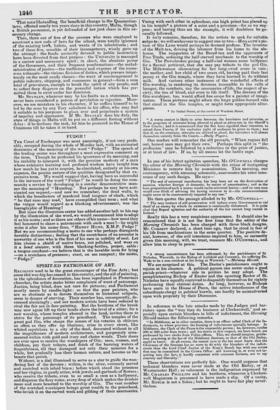SPIRIT-ED PATRONAGE OF ART.
RELIGION used to be the great encourager of the Fine Arts ; but since idol worship has ceased in this country, and the aid of painting, in the splendours of decoration, has been repudiated in Protestant churches, the artists make hitter complaints of want of patronage. Justice, being blind, does not care for pictures; and Parliament mostly meets by candle-light: so that the poor painters, who are so obstinate as to devote themselves to historical subjects, seem in danger of starving. Their number has, consequently, de- creased alarmingly ; and our modern artists have been reduced to rival the fair sex in face-painting. But the brethren of the brush may now again lift up their heads above the level of a sitter; for a new worship, whose temples abound in the land, invites them to strive for the patronage of its priesthood. The temples of the great god Gin, who steeps the senses of his votaries in oblivion as often as they offer up libations, arise in every street, like whited sepulchres in a city of the dead, decorated without in all the magnificence of modern architecture, and gorgeously orna- mented within with gold and ivory and choice woods. Their doors are ever open to receive the worshipers of Gin; men, women, and children, pay their tribute, and drink of the burning waters of forgetfulness, till they disregard not only their miseries for a while, but gradually lose their human nature, and become as the beasts that perish.
Without, is a dial illumined to serve as a star to guide the wan- dering feet of the devotee ; within, is the altar, curiously carved and enriched with inlaid brass; before which stand the priestess and her virgins, in gaudy attire, with jewels and garlands of flowers; who receive the tribute, even to so small a sum as a halfpenny, and dispense the fiery water, every drop of which makes the drinker more and more besotted to the worship of Gin. The vast number of the wretched worshipers brings great wealth to the priesthood, who lavish it on the carved work and gilding of their sanctuaries. Vieing with each other in splendour, one high priest has placed up in his temple* a picture of a saint and a priestess—for so we sup- pose: and having thus set the example, it will doubtless be ge- nerally followed.
It only remains, therefore, for the artists to seek for suitable subjects : we will endeavour to suggest one or two—HOGARTH'S pic- ture of Gin Lane would perhaps be deemed profane. The inventor of the Malt-tax, driving the labourer from his home to the ale- house. The supporters of the Bread-tax and the opponents of Free Trade, seducing the half-starved mechanic to the worship of Gin. The Pawnbrokersgiving a half-clad woman some halfpence for a flannel petticoat, that she may pay tribute to the god Gin.. The Milkwoman clamouring for her long-owed score in vain ; the mother, and her child of two years old, having paid their last penny at the Gin temple, where they have learned to do without milk. And various other instances of the wonderful effects of Gin-worship, in rendering its devotees insensible to the calls of hunger, the comforts, tiay the necessaries of life, the respect of so- ciety, the ties of blood, and even to life itself. The dreams of the Gin-worshiper, too, would afford fine scope for a painter of imagi- nation. These pictures might adorn the huge golden-hooped vats that stand in the Gin temples, or might form appropriate altar- pieces.
• In Oxford Street, at the corner of Ward= Street.
















 Previous page
Previous page